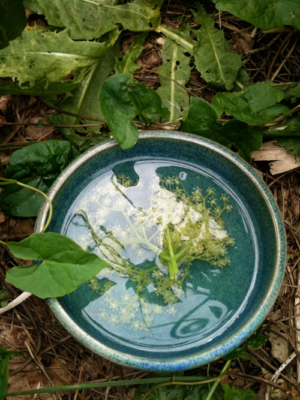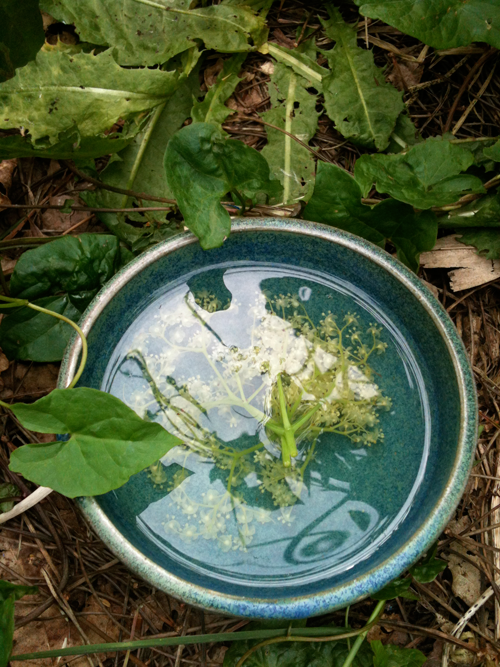Our second Wild Church pilgrimage was guided by Mothiur Rahman, who led us in a contemplative journey upstream alongside the Bidwell Brook which flows through the heart of Dartington village. With pauses for poetry and reflection along the way, Mothiur invited us to explore of themes of disconnection and reconnection in our relationship with water. From our furthest upstream point, as a community we carried a vessel of brook water downstream to where Bidwell Brook flows into the River Dart, being mindful of all the burdens that water carries for humanity. Along the way we witnessed the relationship of water with the Dartington community, as it journeys past local primary schools, the old Cider Press Centre and turns a turbine, generating local electricity, at the old Tweed Mill, before flowing through the woods and Queens Marsh, an important water meadow for migrant birds. Our final point of offering the Bidwell water that we had carried with our blessings, is a popular swimming spot with local youngsters and we emerged from silence to enthusiastic and youthful singing of Rupert Holmes 1980s favourite ‘Escape’

“I felt so honoured by the group who joined me on the Bidwell Brook Blessing, their care and attention as they carried the water of Bidwell Brook in a clay vessel added to the experience of how sharing a burden can reduce the burden until it feels like a privilege to hold it. We walked upstream along the brook from the carpark opposite the shops, through lush greenery and listening the burble and gurgle of the brook as it flowed besides us. Until we came to place of disconnection, where human ownership meant we could no longer walk beside her. But nature remains connected to us if we step outside the boxes of human understanding of ownership, by stepping into the brook and paddling around and feeling her cold waters slip past our feet, re-freshening us and enabling us to connect to her message of continuous flow, continuous change.
A moment of insight came to me when we began walking back downstream and came to the part of the Brook alongside the Dartington shops, where the noise of other people took us out of our contemplative space and more talking arose in our group and I realised this could be a good opportunity to reflect on the meaning of attention in an embodied way, to invite our pilgrim group to try hear the sound of the Brook behind all the other noises as we walked, as a guide to the silent quiet way in which we can be guided in our lives by a sacred source that is all but squeezed out by modern modes of attention-seeking devices and attractions. Here are some of the readings shared along the pilgrimage.”
Dartmoor Pilgrimage
Stand still.
Do you hear my silent call?
Under the roar of helicopter
the boom of firing shell
I come to you blooming
in the redness of rowan berry
the grace and gaze of mare and foal
the stillness of standing rock
And ask you,
children of the earth
draw strength from stillness
and call forth from there
Your fire, your beauty.
(Mothiur Rahman)
Love After Love
The time will come
when, with elation
you will greet yourself arriving
at your own door, in your own mirror
and each will smile at the other’s welcome,
and say, sit here. Eat.
You will love again the stranger who was your self.
Give wine. Give bread. Give back your heart
to itself, to the stranger who has loved you
all your life, whom you ignored
for another, who knows you by heart.
Take down the love letters from the bookshelf,
the photographs, the desperate notes,
peel your own image from the mirror.
Sit. Feast on your life.
The Water Carrier by Deborah Parsons
She held the pottery urn, in both hands, manger like, as if she was holding something of infinite value. Her fingers traced the pockmarked surface, which still held the memory of the hands that had moulded it. The urn was aubergine with hues of peat and metal ore as if the urn had emerged from the very ground on which she was standing.
As the urn was passed to her, she held the gaze of the giver as their hands cupped hers. A reminder of their Oneness with each other and all of creation.
She was surprised by the weight of the water-filled urn, which sloshed from side to side in rhythm with her step.
Suddenly, the import of what she was being asked to do, struck her. Source had spoken:
“I’m calling you to be a Water Carrier.”
“Me?”
“Yes. You.”
She felt the weight of those words. What a privilege. What an honour. What a responsibility.
In her plenitude, she was being asked to give water to others. Suddenly, she understood. She couldn’t hoard the water or keep it for herself or let it stagnate. It could only give life to others, if she gave it away. For how else would she be able to draw fresh water?
And as she emptied herself, she understood how important it was for her to keep her connection to Source. How important it was for her to search out the Water Sources. Without this her urn would soon run dry.
She smiled.
She realized that in her hands she held the key to the mystery of the Universe.
The key to the mystery of Life in all its abundance and beauty.
Water freely given and freely received.

